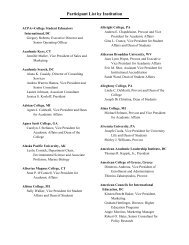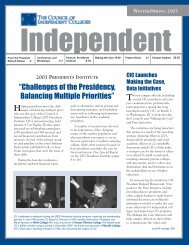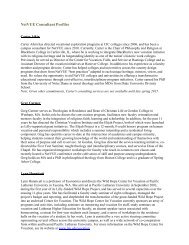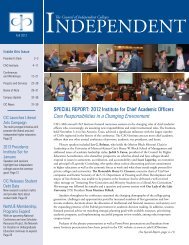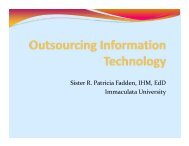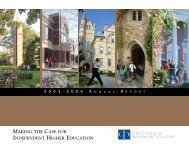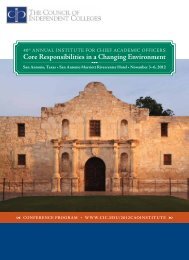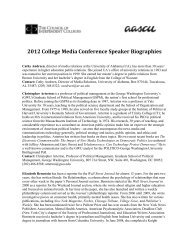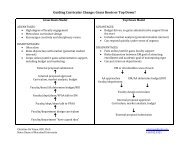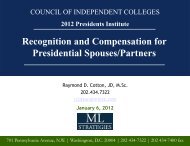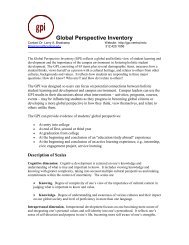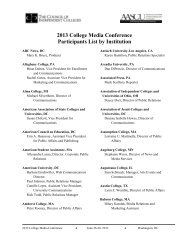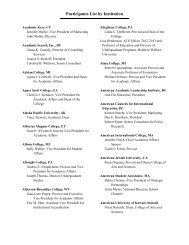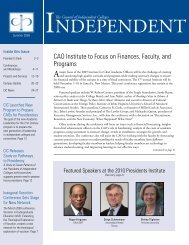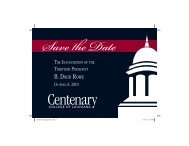Annual Report 2006-2007 - The Council of Independent Colleges
Annual Report 2006-2007 - The Council of Independent Colleges
Annual Report 2006-2007 - The Council of Independent Colleges
Create successful ePaper yourself
Turn your PDF publications into a flip-book with our unique Google optimized e-Paper software.
for strategic attention. <strong>The</strong> IDS engages a team <strong>of</strong> former presidents<br />
and experienced consultants, who review institutional documents<br />
and conduct interviews with key individuals during a campus visit.<br />
<strong>The</strong> purpose <strong>of</strong> the IDS is to enable new presidents to make the most<br />
effective use <strong>of</strong> their early months as president. This service, provided<br />
in cooperation with <strong>The</strong> Presidential Practice (TPP), is funded by the<br />
Andrew W. Mellon Foundation.<br />
Connecting Chief Academic Officers<br />
Institute for Chief Academic Officers—CIC’s 34th<br />
annual Institute for Chief Academic Officers,<br />
which included chief student affairs <strong>of</strong>ficers,<br />
drew the largest number <strong>of</strong> academic leaders in<br />
the history <strong>of</strong> the meeting—with 324 CAOs,<br />
138 CSAOs, 48 other academic <strong>of</strong>ficers, and<br />
others. Chief student affairs <strong>of</strong>ficers are invited to<br />
the Institute every five years. <strong>The</strong> meeting, held<br />
November 4–7, <strong>2006</strong>, in St. Petersburg, Florida,<br />
explored the theme <strong>of</strong> “Leadership for Learning and Student Success.”<br />
<strong>The</strong> national associations <strong>of</strong> student affairs pr<strong>of</strong>essionals—National<br />
Association <strong>of</strong> Student Personnel Administrators and American College<br />
Personnel Association—helped to plan and promote the conference.<br />
Speakers and panelists explored such topics as responding to<br />
societal challenges, balancing student responsibility for learning with<br />
the responsibility <strong>of</strong> academic and student affairs educators, and<br />
competition and accountability as imperatives for institutional leaders.<br />
Plenary speakers included Roger Martin, president emeritus <strong>of</strong><br />
Randolph-Macon College (VA), who delivered the keynote address<br />
on student consumerism and the ivory tower; Diana Oblinger, vice<br />
president <strong>of</strong> EDUCAUSE, who addressed the impact <strong>of</strong> skyrocketing<br />
digital technology on higher education; Jamie Merisotis, founding<br />
president <strong>of</strong> the Institute for Higher Education Policy, who discussed<br />
accountability and leadership for learning (see box); and a closing<br />
session with Michael Witherspoon, former vice president for national<br />
business development for James Tower and now senior vice president<br />
<strong>of</strong> Jon McRae & Associates, and Catherine Cook, CEO, and William<br />
<strong>2006</strong> CAO Institute Plenary Session<br />
“Accountability and Leadership for Learning”<br />
Jamie Merisotis, founding president <strong>of</strong> the Institute for<br />
Higher Education Policy, delivered a plenary address<br />
about managing accountability issues in a way that<br />
is strategic and enhances institutional goals and<br />
priorities. “<strong>The</strong> national landscape <strong>of</strong> accountability<br />
for both institutional and student success that has<br />
emerged over the last few years is likely to have a<br />
pr<strong>of</strong>ound impact on what we do, and how we do it,<br />
in U.S. higher education,” said Merisotis. “<strong>The</strong>se emerging strategies and<br />
approaches are being driven by a fundamental view that higher education’s<br />
performance must improve significantly in order for the nation to achieve<br />
maximum benefit from the investment in higher education.”<br />
“We must take a more holistic view <strong>of</strong> what we do as higher education<br />
institutions in fashioning this new accountability paradigm…. <strong>The</strong> emergence<br />
<strong>of</strong> data-driven strategies and accountability systems have not done nearly<br />
enough to take into account the complex circumstances under which today’s<br />
college students’ lives are lived. <strong>The</strong> ideal scenario <strong>of</strong> a normally persisting,<br />
well-advised, highly motivated student runs headlong into the stark reality<br />
<strong>of</strong> life in America today: prior educational deficiencies, family and child<br />
responsibilities, financial pressures, language and cultural barriers, and<br />
poor information and support systems. <strong>The</strong>se are the very issues that many<br />
<strong>of</strong> your colleges deal with every day, serving as the front lines in the war to<br />
improve our nation’s educational accomplishments….<br />
Countering this bleak prospect will require more than tweaking<br />
at the margins. It will require a true partnership that dedicates time,<br />
understanding, effort, political capital, and financial resources to ensure<br />
that college opportunities are available to students who would not otherwise<br />
attend....<br />
<strong>The</strong> partnership should develop a coordinated strategy and must include<br />
local, state, and federal lawmakers; students and parents; the private<br />
sector; the media; higher education associations and analysts; and college<br />
faculty, staff, and leadership at all kinds <strong>of</strong> institutions…. Investment in<br />
postsecondary education by all members <strong>of</strong> this partnership will lead to<br />
returns that benefit both individuals and society….”<br />
Virginia Union University<br />
<strong>2006</strong>–<strong>2007</strong> <strong>Annual</strong> <strong>Report</strong> •



